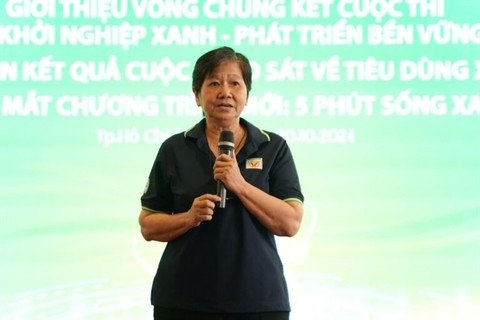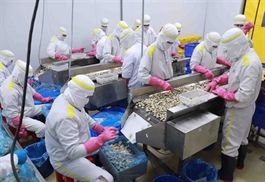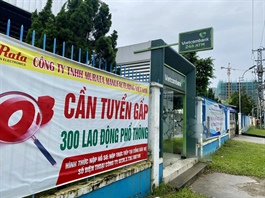Price remains greatest barrier to green consumption
Price remains greatest barrier to green consumption
Though consumers mostly acknowledge the benefits that green consumption brings, there is a considerable gap between awareness and action as reflected in the relatively low priority they place on green consumption, a survey by the High Quality Vietnamese Goods Business Association has found.

Products made from loofah and other green products on display on the sidelines of a press conference to introduce the finals of the 2024 Green -Sustainable Startup Idea/Project Competition in HCM City on Wednesday. — Photo courtesy of BSA |
The 2024 Green Consumer Survey, released at a press conference in HCM City on October 30, said choosing green products and green consumption are not yet a top priority for many consumers. Even in major cities like Hà Nội and HCM City, only 12- 18 per cent of consumers frequently choose green products.
Consumers access information about green products and green consumption mostly on social media, with other sources of information (personal experience, family, sellers, etc.) accounting for less than 40 per cent.
The choice of location to buy green products depends on product characteristics and distribution channels.
The survey found that general and modern trade channels account for similar proportions in supplying green products (67 per cent and 66 per cent).
Online channels also hold a substantial share of around 45 per cent.
In the general channels, specialised stores and distribution agents are the most preferred places for purchasing green products (58 per cent), while grocery and traditional markets are less popular.
Among the modern channels, supermarkets remain the top destination for green products (49 per cent).
The primary customers for green products are aged 31-45 and with university degrees, stable employment, and an income of VNĐ15-30 million a month.
The demographics shift slightly depending on product categories, Nguyễn Văn Phượng, head of market research at the High Quality Vietnamese Goods Business Association, said.
Referring to barriers to green consumption, he said the greatest barriers are high prices, limited availability of green products and lack of information and policies promoting green consumption.
Some consumers lose trust when expensive green products do not meet committed standards.
The survey also found that consumers are willing to pay 5-10 per cent more for green products, with around 20 per cent even willing to pay in excess of 10 per cent, he said.
He said the survey, conducted on a large scale, offers businesses valuable data to refine products, help them meet sustainable consumption demand and ultimately enhance brand reputation.
36 projects to compete in 2024 Green Startup Competition final

Vũ Kim Anh, deputy director of the Business Studies and Assistance Centre, speaks at a press conference to introduce the finals of the 2024 Green -Sustainable Startup Idea/Project Competition in HCM City on October 30. — Photo courtesy of BSA |
The association in collaboration with the Business Studies and Assistance Centre (BSA) announced that the final round of the 2024 Green -Sustainable Startup Idea/Project Competition would be held on November 9 and 10 at the Independence Palace in District 1 with 36 projects from 26 provinces and cities in the fray.
Several of the start-up ideas and projects leverage local resources and are by youths from rural ethnic communities such as the Dao, Mông, Mường, Nùng, Tày, Thái, and Raglai, Vũ Kim Anh, BSA’s deputy director and head of the competition organising committee, said.
She said many new projects have flourished by combining technology and e-commerce for sales while adhering to global production standards.
Smaller projects also have opportunities to network with and learn from larger ones, creating support networks for future entrepreneurial efforts, she said.
Over 11 years of organsing the "Green Startup" programme, the BSA has built a nationwide startup ecosystem.
The Green Startup Competition has achieved impressive milestones: 2,341 contestants with 1,560 projects from 62 provinces and cities have participated, and over 300 awards have been given.
Nearly 30 per cent of the ideas from the competition have been realised, creating practical value in communities, especially in remote, mountainous areas with large ethnic populations, Anh said.
Also at the event, BSA and Maybe Group launched a new media initiative called “5 Minutes for Green Living” that aims to raise awareness and promote a green lifestyle, green actions and sustainable consumption in the community.
























